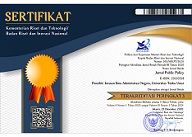Evaluating the Independent Neighborhood Association Program: Success, Challenges, and Economic Implications in Banjarbaru City, South Kalimantan
Abstract
The Independent Neighborhood Association Program is a premier initiative of the Banjarbaru City Head aimed at fostering, mobilising, and promoting community engagement in development and empowerment activities at the Urban Village level, centred on Neighborhood areas. This study is the purpose of the success or failure of policy implementation in the Neighborhood Independent Program. The research employed a qualitative methodology utilising the Edward III Implementation Model for analysis, which evaluates policy success through the dimensions of resources, communication, disposition, and organisational structure. The study's findings indicated that the Independent Neighborhood Association Program, aimed at enhancing the economy of Banjarbaru City, successfully met one of its objectives by mobilising and motivating community participation in regional development activities. However, the enhancement of community welfare remains unobserved, as most POKMAS are still in the implementation phase and have yet to contribute significantly to the community's economic value. The examination of the elements affecting the execution of the Independent Neighborhood Association Program has satisfied four criteria. This encompasses the program's communication, particularly the presence of ongoing Urban Village deliberation; the resource dimension, involving BAPPEDA, the Urban Village head and POKMAS, has successfully executed its responsibilities; the disposition aspect, or the attitude of the implementers of the Independent Neighborhood Association Program, specifically the community group, has effectively conducted business activities, yet a significant challenge persists, hindering progress. POKMAS has the challenge of marketing agriculture. The government structure has been established, with tasks allocated and a method for execution outlined by the SOP for this program.
Keywords
Full Text:
PDFReferences
Bashar, T., & Bramley, G. (2019). Social capital and neighborhood cooperation: Implications for development of the urban poor in LDCs. Urban Studies, 56(13), 2727-2745. https://doi.org/10.1177/0042098018797945
Beysenova A.S., K. K. D., & Aliaskarov D.T., K. Е. A. (2016). Innovative development of cities: theoretical aspects. KazNU Bulletin. Geography, 1(42).
Buklis, S. (2021, November 26). Banjarbaru Independent RT Program Realized in 2022, Each RT Gets IDR 75 Million Assistance, this is the Purpose. TribunBanjarbaru.Com.
Fitri Lubis, E., & Zubaidah, E. (2019). The Effectiveness of the Community Empowerment Program Based on Rukun Warga (PMB-RW) in Realizing Tridaya Principles in Pekanbaru City. PUBLIKA: Journal of Public Administration Science, 5(2), 156-163. https://doi.org/10.25299/jiap.2019.vol5(2).4188
Kania, I., Geusan, G., Raturahmi, L., Ulumudin, A., Rustiana, E., & Budiman, M. (2019). The Analysis of the Village Law Implementation Policy Using Edward III Model Approach in Garut. The International Seminar Series on Regional Dynamics Proceeding, 201-205. https://doi.org/10.19184/issrd.v1i1.13735
Decree of the Mayor of Banjarbaru City Number 148 of 2021 concerning Pilot Project of Independent Neighborhoods and Community Groups for the Implementation of Independent Neighborhood Association Activities in 2022, (2021).
Lestanata, Y., & Pribadi, U. (2016). Effectiveness of the Implementation of the Neighborhood-Based Development Program in West Sumbawa Regency in 2014-2015. Journal of Governance and Public Policy, 3(3), 368-389. https://doi.org/10.18196/jgpp.2016.0063
Manyo'e, E. T. (2022). Analysis of One-Stop Pattern Training Policy Implementation with the Edward III Model in Gorontalo Regency. KNOWLEDGE: Journal of Innovation Research and Development Results, 2(3), 227-240. https://doi.org/10.51878/knowledge.v2i3.1599
Muhammad Sapuan, Samad, & Aras, M. (2024). Public Policy Implementation of the Village Infrastructure Acceleration Program (PIK). J-PIS (Ibnu Sina Journal of Service), 3(2), 153-162.
Mustanir, A., & Abadi, P. (2017). Community Participation in Development Plan Deliberation in Kanyuara Village, Watang Sidenreng Urban Village , Sidenreng Rappang Regency. Journal of Prophetic Politics, 5(2), 247-261.
Novitasari, D., Rostyaningsih, D., & ... (2020). Stakeholder Analysis in the Implementation of Thematic Arts and Culture Village in Tembalang Village. Journal Of Public Policy And Management Review, 9(1), 1-12. https://doi.org/https://doi.org/10.14710/jppmr.v9i1.26197
Ohal, G. A. R. (2023). THE DYNAMICS OF SOCIAL CAPITAL MANAGEMENT BY RUKUN TETANGGA (RT) AS A LOCAL INSTITUTION. College of Rural Community Development.
Banjarbaru City Mayor Regulation Number 77 of 2021 concerning Guidelines for the Implementation of the Independent Neighborhood Association Program, Pub. L. No. Number 77 of 2021 (2021).
Purboningsih, D., Azwari, T., & Aziz, N. A. (2023). Implementation Gap of Thematic Tourism Development Policy in Kampung Sayur Banjarbaru City. Journal of Public Policy, 9(1), 65. https://doi.org/10.35308/jpp.v9i1.5978
Putra, R. H., & Khaidir, A. (2019). Concept of George C. Edwards III on Implementation of Regional Regulations No. 12 of 2017 Concerning Youth in Granting Youth Service in West Sumatra. International Journal of Progressive Sciences and Technologies (IJPSAT, 15(1), 236-242.
Rokhadiyati, A. (2020). Evaluation of Implementation Policy on Management of School Operational Fund (BOS) 2019 with Edward III Model. Journal of Education and Teaching, 53(1), 25-42. https://doi.org/10.23887/jpp.v53i1.24625
Sari, C. N., Heriyanto, M., & Rusli, Z. (2018). Effectiveness of the Implementation of the Community Empowerment Program Based on Rukun Warga. JIANA: Journal of State Administration Science, 15(1), 135-141.
Setyawan, D., Priantono, A., & Firdausi, F. (2021a). The George Edward III Model: Implementation of Regional Regulation No. 2/2018 on Smokefree Areas in Malang City. Publicio: Scientific Journal of Politics, Policy and Society, 3(2), 9-19. https://doi.org/10.51747/publicio.v3i2.774
Sugiyono. (2018). Quantitative, Qualitative, and R&D Research Methods. Alfabeta.
Wahyudi, J. (2016). Implementation of Neighborhood-Based Development (PBRT): Experience of Governance in West Sumbawa Regency. Government: Journal of Government Science, 9(1), 1-10.
Willius, J., Milwan, & Sudirah. (2022). Implementation of RT-BERSIH (Neat, Orderly, Clean, Healthy, Beautiful, and Harmonious) Program. Jayapangus Press, 5(3), 370-382.
Zaina, H., & Wicaksono, I. (2018). IMPLEMENTATION OF POLICY on the Establishment of RT/RW AS VILLAGE Civic Institutions (Study of Sukorejo Village, Sumber Wringin Subdistrict, Bondowoso Regency in 2018).
Zuhdi, S., Ferizko, A., & Melinda, P. (2019). Institutional Strengthening of Rukun Tetangga and Rukun Kampung (RT / RW) in Rintis Village, Lima Puluh District, Pekanbaru City. Journal of Public Service Management, 3(1), 49. https://doi.org/10.24198/jmpp.v3i1.23683
DOI: https://doi.org/10.35308/jpp.v10i3.8372
Refbacks
- There are currently no refbacks.
Copyright (c) 2024 Dewi Purboningsih, Anjani, Nana Abdul Azis
p-ISSN: 2477-5738 I e-ISSN: 2502-0528 I DOI: 10.35308
Jl. Alue Peunyareng, Ujong Tanoh Darat, Meureubo, Kabupaten Aceh Barat, Aceh 23681, Indonesia
(0655) 7110535 l +621260313742 l +6285277110911
 is licensed under a Creative Commons Attribution-ShareAlike 4.0 International License
is licensed under a Creative Commons Attribution-ShareAlike 4.0 International License


